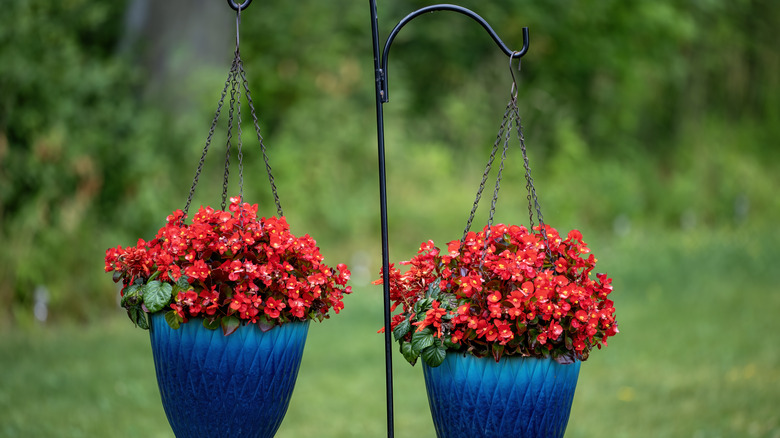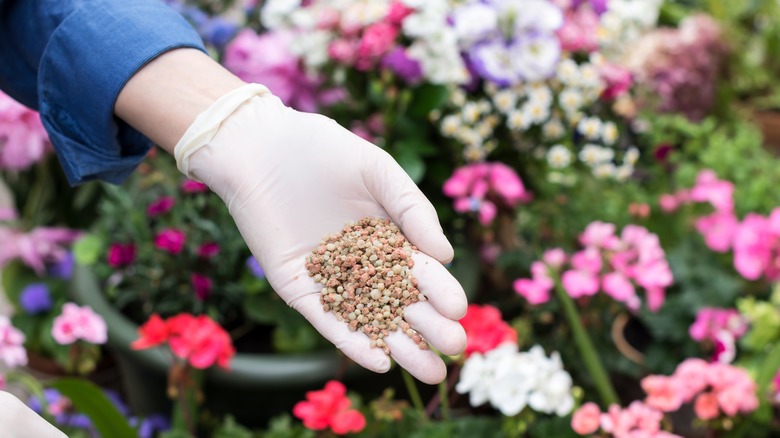Why You Should Use 10-10-10 Fertilizer For Thriving Begonias
Begonias are beautiful tropical plants that thrive in warm climates and are often grown as houseplants because they can only survive outdoors in USDA hardiness zones 10 through 11 and cannot tolerate temperatures below 55 degrees Fahrenheit. But if they're given the right conditions, they're fairly easy to grow, and with over 2100 species to choose from, there's likely to be quite a few you want to grow in your home. Just keep in mind that if you grow begonias in your garden rather than in a container, you'll need to check which begonia flowers are invasive and which make a beautiful addition to your yard, depending on where you live. No matter how you grow them, for your begonias to thrive, you should use a 10-10-10 fertilizer as these plants require a balance of all three major nutrients.
A balanced or complete fertilizer that has equal amounts of nitrogen, phosphorus, and potassium will ensure your begonia plants will get enough nutrients for growth, root and flower development, strength, and disease resistance. Using a slow-release, balanced fertilizer also means that your plants will have strong stems and not become too leggy.
What is a 10-10-10 fertilizer?
Essentially, a 10-10-10 fertilizer has equal amounts of the major nutrients required for plant growth — nitrogen, phosphorus, and potassium. The three numbers indicate the percentage of each particular nutrient in this same order. This is commonly referred to as a balanced or complete fertilizer because the percentages of all the major nutrients are equal. So, you could even use a fertilizer labeled as 15-15-15 or 20-20-20 because these are all regarded as complete.
For container-grown begonias or even those grown in your garden as annuals or bedding plants in warmer regions, you could either use a slow-release fertilizer in granular form or a liquid one that you mix with water. A slow-release fertilizer will release the nutrients gradually as the plants need it, while a liquid fertilizer releases its nutrients as soon as it's applied. Feeding your begonias every two weeks during active growth if you're using a liquid nutrient solution is recommended. Just keep in mind that if you're growing begonias as indoor plants, you should keep them away from your pets because begonias are one of the numerous popular houseplants that are actually toxic to dogs.
Why begonias love a balanced fertilizer
Begonias benefit from a balanced fertilizer because it contains equal amounts of the nutrients required for growth, flowering, and optimum health. Many begonias have stunning foliage, and the nitrogen enhances the growth in a complete fertilizer. Essentially, nitrogen is instrumental in stimulating new leaf growth but needs to be balanced with the other nutrients to get the right mix of leaf growth and also flowering.
On the other hand, phosphorus will promote excellent root growth when the plants are young while also helping stimulate flowering. Finally, potassium helps to strengthen plants, enhancing their resistance to disease and drought. As most begonias are grown in containers, unless you live in a warm region, the plants cannot get the nutrients they need once any fertilizer in the potting soil has been depleted. So, while you could do a soil test when you're growing outdoors in the ground and only supply the deficient nutrients, plants commonly grown in containers, such as begonias, will almost always need equal amounts of the three major nutrients in the form of an all-purpose fertilizer for optimum growth. As begonias are one of several houseplants that even beginners can grow, if you follow this fertilizing guide, you simply can't go wrong.


